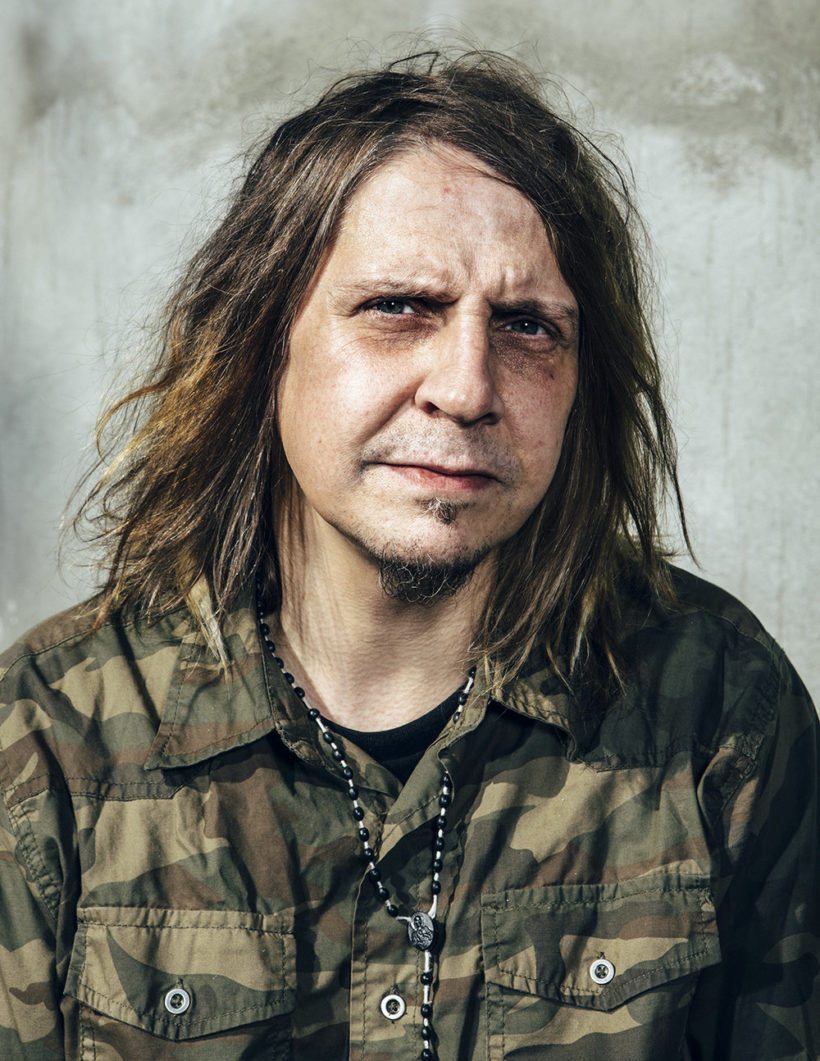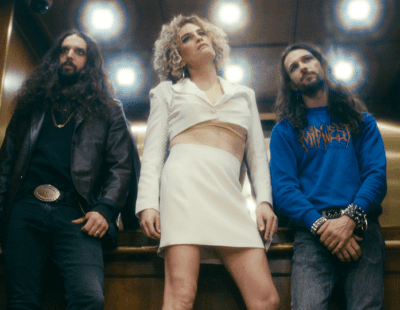
Eyehategod’s Mike Williams (photo by Daymon Gardner).
Eyehategod vocalist Mike Williams grew up hard in the ’80s, when he was a teenager going to punk rock shows and starting down a reckless, nihilistic path that led to him becoming the vocalist of one of underground metal’s most extreme bands.
It also led to the day when a doctor told Williams that he had destroyed his liver from years of abuse and that he needed to have his replaced.
“Yeah, man; I was a teenager back in the old days, going to see Black Flag, Misfits, Minor Threat, Dead Kennedys, that was my teenage years, doing all that stuff,” says Williams. “The wild stuff came with that. That was back in the ’80s.”
Now Williams is staring at life on the recovering end of a successful liver transplant. He’s also speaking as a man who has been sober for a year and a half.
“Anybody getting sober after a lifetime of drinking is going to tell you it’s not easy,” he says. “You just have to fight through it. You come out the other side happier because you know you beat something you struggled with. I feel stronger for it. I think addiction is a disease, heroin or alcohol; it’s there and who knows why people do it, but when it gets into your bones, you’re screwed, but you fight through it. It’s all about the willpower, man, and how strong your mind can be.”
Williams says that his liver problems were going on long before he went public with them. And he says that he kept drinking even after he got the bad news, as a way of coping with what was going on.
“The whole thing started years ago, honestly,” he says. “I had cirrhosis of the liver; my liver was totally destroyed, man. Honestly, from years of drugs and alcohol, to be truthful. I’m not going to lie about it; that’s the truth. I found out probably two or three years ago, but I continued to do what I do, and drink a bottle of vodka a day and not give a fuck. I was trying to forget about being sick, and I really did more and more damage to myself, until it was to the point where I was unable to even function at that point, you know?”
He points to an Eyehategod tour last April as being particularly bad for him, and says that, with the encouragement of his wife Michelle, he decided it was time to follow through on the doctor’s advice.
“I needed a liver transplant,” he says. “I needed a whole brand new liver or that was it. I was gone. I was dead.”
Even though this news would be shocking to most, Williams says that after spending a lifetime annihilating his body, it wasn’t exactly a surprise to hear the doctor say he needed a new liver.
“I mean, I kind of expected them to say that,” he admits. “I kind of knew what I’d been doing to myself all these years, and I knew what was going to happen eventually. Your body can’t last forever. I’d been partying and doing whatever since I was a young teenager. It’s going to catch up to you. I don’t want to be a preacher as I get older, but kids think they’re invincible.”
Still, Williams says that even though his years of hard partying got him in this situation, he doesn’t look back and wish he had taken a different path.
“I don’t regret anything,” he says. “I will never regret anything. I’m glad I’ve lived the way I did. I still live hard. So when they told me that, I pretty much was like, ‘Okay. It figures,’” he says with a laugh.
In December of 2016, Williams went through with the liver transplant; today, with a new liver and a new sober outlook on life, he has a spring in his step that friends, family, and fans are glad to see.
“I wake up and feel great,” he says. “It’s amazing. I get out of bed and I’m not nauseous, nothing’s aching, I’m not in the hospital and I’m not having to go the hospital, which was the case there for pretty much a whole year, I was in and out of the hospital. So I feel great, man. It’s amazing what they can do.”
Williams says that the support of the metal community, both financially and mentally, helped him get through that period in the hospital.
“I got the transplant in December of last year, so leading up to that I was in the hospital since October. Every day I’d wake up in the hospital and get on my computer and my phone and just read everything people were saying. This was when I finally came public with it. As my wife said in a thing she wrote, ‘Mike’s a very private person,’ so I wasn’t telling anybody anything. They were like, why is Eyehategod cancelling shows? Finally, when Randy [Blythe] and Phil [Anselmo] did those shows for me, she was like, you need to tell people and put it out in the open. It was overwhelming. Amazing that people would have that much love for this band, and for me, and for us in general. How much people might condemn this type of music or this scene for being extreme and this and that, everybody loves each other, and that’s a beautiful thing.”
The support of the community got him through, but that’s the same community who cheered Williams on as he was, for years, quite publicly destroying his liver on stage, plowing through bottles of the hard stuff. But Williams says that it’s alright that audiences encouraged him as he continued to damage himself.
“That’s what people do,” he says. “People are still going to be like that. At shows we played a couple weeks ago, people were holding their beers up in my face. I’m sober now, I’m not drinking at all. People were holding beers up to me, and taunting me. It’s a rock and roll show, man. That’s what’s supposed to happen. I’m at the age I am, I’m over it right now, I’m not drinking anymore. I’ve drank enough for 10 lifetimes. I think I’m okay. So it doesn’t bother me that people do that. They’re going to do that at a rock show. That’s what happens.”
Today, Williams is 50 and happy. But he says that he never thought he’d live past 30, a time-worn punk rock battle call that he has since abandoned.
“My whole agenda was getting wasted until the day I die,” he says. “But things can change. I’ve got a great wife and my life is really good right now, so I kind of want to live. It’s good to be alive. It’s not like I used to be, where I was like, fuck it, and just super reckless with my life, and every other day was a dodge of death, going to jail or something. But it’s kind of fun to see how long you can survive.”
Williams credits his change in attitude to Michelle, and says that he can still be the same creative, nihilism-loving Mike Williams we all know but can also manage to have a smile on his face at the end of the day.
“I think it takes the right person; my wife changed my way of thinking a lot. I can still be creative and do Eyehategod. That’s art, but at the same time I can actually be a happy person. Which is a good thing. Any artist will tell you that they can bring the pain out in their art but they still are happy otherwise. It wasn’t always like that for me; it was just in the past few years where I’ve been a really happy person. Before that, it was just complete nihilism,” he chuckles.
But, rest assured there’s still a bit of that nihilistic punk-rock Mike Williams inside the new and improved Mike Williams.
“To a point, all those things don’t go away, you know,” he says. “I just happen to be older now and enjoy life. I never thought I’d say that, but it’s true.”
As for what’s next for Eyehategod, the band is off on tour and then coming back to hit the studio to lay down some new tracks.
“We’re just going to keep on going, man. That’s what I like to do—play shows, tour, have fun. We’ve got new songs written, and when we come back from this little run we’re going to hopefully go right into the studio and record stuff. Not sure how many songs we’re going to record, but we’re going to hit the studio again and just keep it going, just like we always do. Keep the machine rolling, you know? Keep the machine rolling.”
Looking back on the liver transplant, Williams sees it as one more story in what is turning into a long line of stories to tell. But Eyehategod fans know that this story is an especially important one, because it’s the one that saved their beloved nihilistic frontman.
“It’s all part of life. I’ve been through Hurricane Katrina. I’ve been through this thing with the liver. I’ve been through buying drugs in the projects and almost getting shot [laughs], but you live and are better for it in the end. You come out a stronger and better person. You’ve got stories to tell.” Williams sounds cohesive and clear as he says the words Eyehategod fans have been secretly hoping he’d say for years: “It’s a good life, man.”







